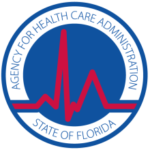
Under Governor DeSantis’ leadership, the Agency for Health Care Administration (Agency) has continued to spearhead bold initiatives and build off of the foundation laid for a patient-centered health care system in Florida.
Acting Secretary Shevaun Harris said, “Under the charge of Governor DeSantis, the Agency remained adaptable to quickly meet needs as we faced challenges to ensure the safety of patients and their continued access to quality health services in Florida. Protecting the most vulnerable was the priority during these unprecedented times.
“Driving transformation through greater accountability and broader transparency, the Agency has paved a pathway forward for the importation of safe and affordable prescription drugs; provided meaningful facility-level information directly to Floridians regarding COVID-19; and helped construct a blueprint for the safe reopening of long-term care facilities to reunite loved ones in Florida, among many other significant accomplishments this year.”
Implementing Canadian Prescription Drug Importation
Governor Ron DeSantis has been a national leader in the movement to safely import prescription drugs. Under his leadership, the Agency has worked with the federal government to help shape federal policy on the importation of prescription drugs from Canada. In September 2020, the Trump Administration took action to complete the rule making process allowing the importation of certain prescription drugs from Canada to lower health care costs. Governor Ron DeSantis recently announced the Agency officially submitted its Section 804 Importation Proposal (SIP) to the U.S. Department of Health and Human Services for Florida’s Canadian Prescription Drug Importation Program. The Agency is in the process of implementing the program which will yield anticipated cost savings of $150 million annually to the state within taxpayer funded programs when the program is fully operational. As the Governor’s vision comes to fruition, Floridians across the state will have increased access to life saving medications.
Launching Statewide Hospital Bed Capacity Dashboard
In April 2020, the Agency published a data dashboard of current hospital bed availability to provide the public with greater visibility on hospital capacity and census. This vital statewide resource is comprised of self-reported bed availability by all Florida hospitals. The dashboard provides critical, real-time information to better inform state and local planning and response to the need for more hospital beds.
The dashboard is supported with data from the Emergency Status System (ESS), where facilities enter emergency planning and response information and report situational awareness information during emergency events, such as hurricanes.
Taking Early, Proactive Steps to Protect Long-Term Care Residents
In early March, the Agency provided long-term care facilities guidance on restricting and screening visitors, sending a visitor screening toolkit developed in conjunction with stakeholder groups. On March 11, the Florida Division of Emergency Management (FDEM) issued an Emergency Order requiring comprehensive screenings of both staff and visitors at long-term care facilities and formalizing many precautions the Agency already asked residential providers to take.
On March 15, FDEM issued an Emergency Order restricting visitation at long-term care facilities with narrow exceptions and requiring COVID-positive residents to receive two negative tests separated by 24 hours before being readmitted to long-term care facilities. Further, on March 18, the Agency began requiring staff of long-term care facilities to implement universal use of facial masks while in the facility and wearing gloves when providing direct care to a patient or resident.
Establishing COVID-19 Isolation Centers
The Agency established COVID-19 isolation facilities to support long-term care providers, help with hospital decompression and protect long-term care patients during the COVID-19 public health emergency. The Agency had agreements with 23 facilities throughout the state of Florida.
Supporting Family Connection with Long-Term Care Visitation
Governor Ron DeSantis announced the formation of Florida’s Task Force on the Safe and Limited Re-Opening of Long-Term Care Facilities in August of this year to combat the effects of months of isolation. Members of the task force met five times and worked together to develop guidelines on how to safely allow family members to visit and reconnect with their loved ones in Florida’s long-term care facilities. You can see the Task Force report here and the most recent FAQ regarding visitation for long-term care residents here.
Protecting Residents and Patients Through Infection Prevention Inspections
The Agency shifted resources from routine work to prioritize complaint inspections and visits to facilities with previous infection control issues. Beginning in March, field offices completed 5,719 focus infection control surveys in nursing homes, assisted living facilities and intermediate care facilities.
Creating Greater Flexibility in Florida’s Medicaid Program
Florida was the first state to use the 1135 Waiver Authority to extend flexibilities in provider enrollment and waive prior authorization requirements for Medicaid. In addition, Florida Medicaid implemented other flexibilities to ensure critical coverage and access to health care services, such as waiving co-pays and lifting key service limits, extending pharmacy refills, and significantly expanding access to service through telehealth.
Protecting Long-Term Care Residents During Hurricanes
All nursing homes and assisted living facilities in Florida now have onsite generators to support emergency power and safe temperatures during power outages. Facilities worked diligently to develop and implement emergency power plans, and during the 2020 Hurricane Season many facilities experienced the benefit of this valuable resource.
Housing Assistance Pilot Program Launched
The Agency, in collaboration with certain health plans participating in the Statewide Medicaid Managed Care program, has implemented a housing assistance pilot program in Pinellas, Pasco, Seminole, Orange, Osceola and Brevard counties, to serve up 4,000 Medicaid recipients. The goal of the pilot is to facilitate housing stability and improve health outcomes for those with mental illness or substance abuse disorder who are homeless of at risk for homelessness.
The Agency for Health Care Administration is committed to better health care for all Floridians. The Agency administers Florida’s Medicaid program, licenses and regulates more than 44,000 health care facilities and 53 health plans, and publishes health care data and statistics at www.FloridaHealthFinder.gov. Additional information about Agency initiatives is available via Facebook (AHCAFlorida), Twitter (@AHCA_FL) and YouTube (/AHCAFlorida).
